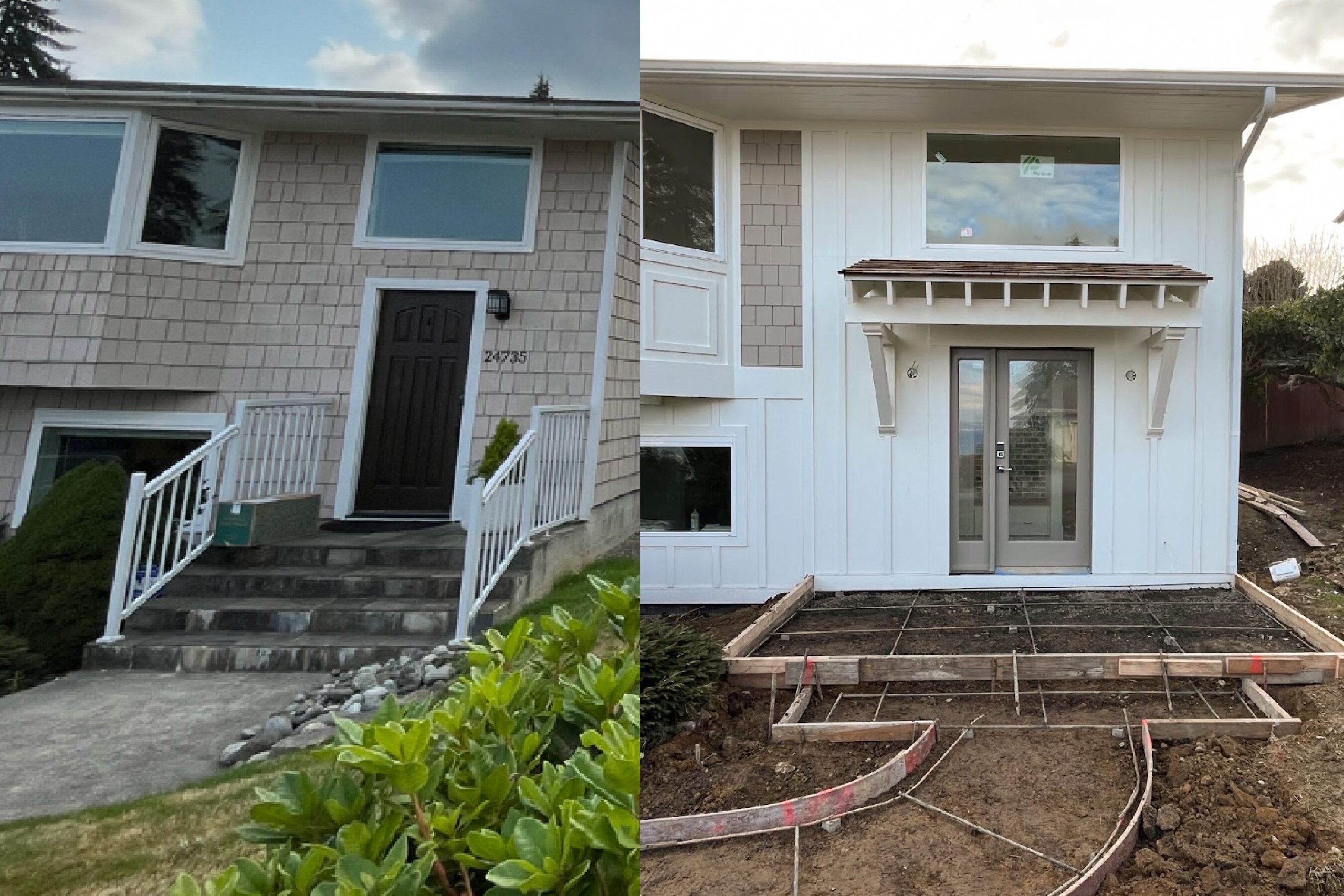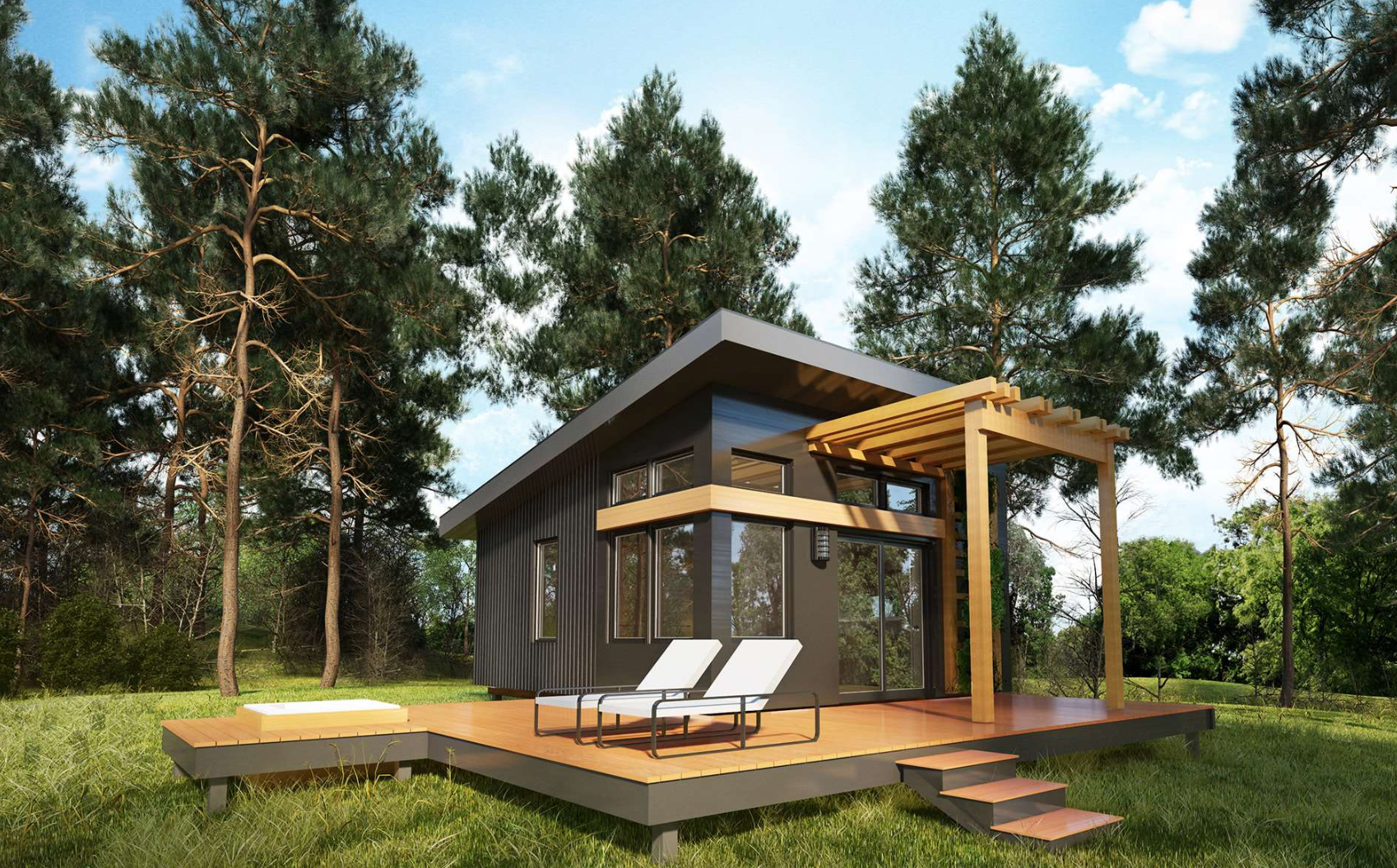Accessory Dwelling Units (ADUs), also known as granny flats, in-law suites, or backyard cottages, have become increasingly popular as a means of expanding living space, generating rental income, or accommodating aging family members. However, building and renting an ADU is not without its challenges, primarily due to zoning regulations and legal requirements. In this guide, we will walk homeowners through the process of understanding and navigating ADU zoning laws and legalities. We’ll also provide valuable tips on obtaining permits and complying with local regulations to help you make your ADU project a reality.
Research Local Zoning Laws
Researching local zoning laws is a crucial step in the process of building and renting an Accessory Dwelling Unit (Look here for Washington State ADU laws). Zoning laws are specific regulations set by local governments that dictate how land and property can be used within different areas or zones of a city or county. When it comes to ADUs, these laws greatly impact the feasibility and design of your project. To begin your research, reach out to your local city or county planning department or visit their website to access the relevant zoning codes and regulations. These documents will provide essential information on zoning districts, property eligibility for ADUs, setback requirements, size limitations, and any specific design guidelines that must be followed.
Understanding your local zoning laws is crucial because they determine whether your property is eligible for an ADU and what restrictions may apply. Some areas have more lenient regulations that allow for ADUs on most residential properties, while others may have stringent requirements that limit ADU development to specific zones or lot sizes. By thoroughly researching and comprehending your local zoning laws, you’ll be better prepared to tailor your ADU project to meet all the necessary legal requirements, ensuring a smoother and more successful endeavor.
Consult with Zoning Officials
Consulting with zoning officials is a pivotal step in navigating the complex landscape of ADU regulations and zoning laws. These officials are experts in local zoning codes and provide valuable guidance specific to your property and project. Initiating a conversation with zoning officials is typically done by scheduling a meeting or visiting your local city or county planning department. During this interaction, you gain insights into the intricacies of your local regulations and ask questions about zoning district restrictions, setbacks, size limitations, and other pertinent details.
Zoning officials also offer advice on how to tailor your ADU project to meet these regulations. They provide clarification on any ambiguities in the zoning codes and help you understand the feasibility of your project within the bounds of the law. Moreover, involving zoning officials early in the process prevents potential issues down the road, as their expertise steers your project toward a more seamless approval process. Their insights help you craft a well-informed and compliant ADU plan that aligns with your property’s zoning requirements, ensuring a smoother path toward obtaining necessary permits and successfully executing your project.
Determine Property Eligibility
Determining property eligibility is a crucial step in the process of building an Accessory Dwelling Unit (ADU). Local zoning laws and regulations often define specific criteria that properties must meet to be eligible for ADU construction. These criteria include factors such as minimum lot size, zoning district requirements, and adherence to certain design guidelines. To establish whether your property is eligible, it’s essential to thoroughly review your local zoning ordinances and consult with zoning officials or your local planning department.
Zoning ordinances may dictate that your property must be within a particular zoning district to qualify for an ADU. Additionally, some areas may require a minimum lot size to ensure that the property accommodates both the primary residence and the ADU without infringing on setbacks or other restrictions. By researching and confirming your property’s eligibility early in the planning process, you avoid potential setbacks and ensure that your ADU project aligns with the legal requirements of your locality. If your property doesn’t meet the initial eligibility criteria, zoning officials may be able to provide guidance on potential variances or exceptions that could allow your project to proceed.
Design Considerations
Design considerations are a crucial aspect of planning an Accessory Dwelling Unit (ADU) project that complies with zoning laws and legal requirements. When developing your ADU’s design, it’s essential to strike a balance between meeting local regulations and creating a functional, appealing living space. Here are some key design considerations to keep in mind:
-
- Size and Scale: Zoning ordinances often stipulate maximum size and height limits for ADUs to ensure they integrate harmoniously with the existing neighborhood. Pay close attention to these limits when designing your ADU to avoid potential legal hurdles and to maintain the character of your property and the surrounding area.
-
- Setbacks and Placement: Zoning laws typically specify setback requirements, which determine how far your ADU must be positioned from property lines, existing structures, and the primary residence. Proper placement is essential to comply with these regulations while optimizing the use of your property.
-
- Aesthetic Harmony: Some jurisdictions require ADUs to maintain architectural compatibility with the primary residence and the neighborhood’s character. This means your ADU’s design should consider elements like exterior materials, rooflines, and overall aesthetics to ensure it blends seamlessly with the existing structures.
-
- Parking Considerations: Many zoning codes have parking requirements for ADUs, which impact your design. Explore parking solutions that accommodate these requirements while efficiently utilizing your available space.
-
- Accessibility and Universal Design: Consider incorporating accessibility features and universal design principles if your ADU is intended for aging family members or as a rental property. Features like wider doorways, no-step entrances, and accessible bathrooms enhance the unit’s functionality and appeal to a broader range of occupants.
-
- Energy Efficiency: Prioritize energy-efficient design elements in your ADU plans to reduce environmental impact and long-term operating costs. Incorporate insulation, energy-efficient windows, and sustainable materials into your design to maximize energy performance.
-
- Privacy and Light: Plan the layout and placement of windows and entrances to ensure privacy for both the primary residence and the ADU. Additionally, strive to maximize natural light and ventilation to create comfortable living spaces.
-
- Safety Measures: Building codes mandate specific safety features in ADUs, such as smoke detectors and fire-rated materials. Familiarize yourself with these requirements and incorporate them into your design to ensure a safe living environment.
By carefully considering these design aspects while keeping local zoning laws and legal requirements in mind, you create an ADU that not only complies with regulations but also enhances your property’s functionality and aesthetics. Collaborating with professionals, such as architects or designers experienced in ADU construction and local regulations, further assist in developing a well-balanced and compliant ADU design.
Apply for Permits
Applying for permits is a critical step in the process of building an Accessory Dwelling Unit (ADU) while adhering to zoning laws and legal requirements. Permits are essential documents that grant you the legal authorization to construct your ADU, ensuring that your project complies with all relevant building codes and regulations. Here are some key considerations when applying for permits:
-
- Understanding the Permitting Process: The permitting process varies depending on your location, but it generally involves submitting detailed plans and documents to your local building department. Familiarize yourself with your city or county’s specific permit requirements, including the types of permits needed, associated fees, and the submission process.
-
- Detailed Plans and Documentation: Prepare comprehensive plans for your ADU, including architectural drawings, structural plans, electrical and plumbing schematics, and any other relevant documents. These plans should align with local building codes and zoning regulations. Consulting with an architect or builder experienced in ADU construction helps ensure that your plans meet all legal requirements.
-
- Permit Fees: Be aware that obtaining permits typically involves paying fees. The cost of permits varies depending on the scope of your ADU project and your location. It’s essential to budget for these fees in advance to avoid delays in your project timeline.
-
- Plan Review and Approval: Once you submit your permit application and accompanying documents, your local building department will review them to ensure they comply with zoning laws and building codes. This review process takes several weeks or even months, depending on the complexity of your project and the workload of the department.
-
- Inspections: After receiving your permits and commencing construction, you’ll need to schedule inspections at various stages of the project to ensure compliance with building codes and safety standards. These inspections are typically conducted by local building officials or inspectors.
-
- Certificate of Occupancy: Once your ADU construction is complete and all inspections have passed, you’ll be issued a Certificate of Occupancy (CO), which signifies that your ADU is safe and legally habitable. This certificate is crucial if you plan to rent out the ADU or use it as a separate living space.
-
- Professional Assistance: Navigating the permit application process can be complex, and any errors or oversights often lead to delays and additional costs. Consider working with professionals, such as architects, builders, or permit expediters, who have experience in securing ADU permits and can streamline the process for you.
By carefully following the permitting process, you ensure that your ADU project complies with all zoning laws and legal requirements, reducing the risk of complications or legal issues down the road. It’s essential to stay informed about local regulations, plan diligently, and maintain open communication with your local building department throughout the permitting process to achieve a successful and compliant ADU project.
Budget for Costs
Budgeting for the construction of an Accessory Dwelling Unit (ADU) requires careful consideration of various factors to ensure your project complies with zoning laws and legal requirements. One of the primary aspects to account for is the construction expenses, which encompass materials, labor, and permits. To create an accurate budget, it’s advisable to obtain detailed quotes from contractors or builders, taking into account the potential for cost overruns or unforeseen challenges that may arise during construction. Additionally, don’t forget to research permit fees specific to your location, as well as architectural and design fees if you plan to work with professionals to create compliant ADU plans. Ensuring that these expenses are accounted for will help you maintain financial control and legal compliance throughout the construction process.
Another vital component of your budget is considering ongoing costs. This encompasses expenses such as property taxes, insurance, maintenance, and, if applicable, utility costs. If you intend to rent out the ADU, factor in furnishings, appliances, fixtures, and interior finishes to make the unit attractive to potential tenants. It’s also wise to allocate a contingency fund, typically around 10% to 20% of your total construction budget, to account for unexpected expenses during the project. Proper budgeting not only ensures that you have the financial resources to complete your ADU but also helps you navigate potential financial challenges while adhering to zoning laws and legal requirements.
Address Parking Requirements
Addressing parking requirements is a critical aspect of complying with zoning laws and legal requirements when planning and building an Accessory Dwelling Unit (ADU). Many local jurisdictions have specific regulations concerning the provision of parking spaces for ADUs. Here are some key considerations.
First, research your local zoning regulations to determine the specific parking requirements for ADUs in your area. Some municipalities may mandate that you provide one or more off-street parking spaces for the ADU, while others may offer exemptions or waivers based on factors such as proximity to public transportation, the size of the ADU, or the availability of on-street parking.
If parking is required, evaluate your property’s layout to identify suitable locations for the parking spaces. Ensure that these spaces are easily accessible and do not encroach on required setbacks or violate other zoning regulations.
Consider alternative parking solutions if your property lacks sufficient space for traditional parking. Depending on local regulations, you may explore options like tandem parking, shared parking agreements with neighbors, or the use of a nearby public parking facility. Some jurisdictions also allow for the conversion of an existing garage or carport into an ADU, provided that parking can be accommodated elsewhere on the property.
By addressing parking requirements early in your ADU planning process, you ensure that your project aligns with zoning laws and legal requirements while maximizing the functionality of your property. Consulting with local authorities or zoning officials can provide clarity on parking regulations specific to your location and help you navigate any potential challenges related to parking compliance.
Comply with Building Codes
Complying with building codes is an essential aspect of ensuring that your Accessory Dwelling Unit (ADU) project adheres to zoning laws and legal requirements. Building codes are a set of regulations that govern the construction and safety standards for structures. They are put in place to safeguard the well-being of occupants and the surrounding community. Here are some key considerations for complying with building codes:
First and foremost, it’s crucial to familiarize yourself with your local building codes and regulations. These codes vary significantly from one jurisdiction to another, so it’s essential to consult the specific codes applicable to your area. You usually access these codes through your city or county’s building department or on their official website.
Next, work with professionals who are well-versed in local building codes. Architects, builders, and contractors with experience in ADU construction can help ensure that your project design and execution align with the legal requirements. They can create detailed plans that adhere to structural, electrical, plumbing, and safety standards.
Throughout the construction process, schedule and pass inspections at various stages to verify compliance with building codes. Local building officials or inspectors will assess your ADU’s construction to ensure that it meets all safety and habitability standards. This step is essential for obtaining a Certificate of Occupancy, which signifies that your ADU is legally ready for occupancy and use.
Compliance with building codes is non-negotiable, as it ensures the safety and quality of your ADU. Failure to adhere to these codes can result in costly delays, fines, or even the need to tear down and rebuild portions of your ADU. By diligently following local building codes and working with professionals who are knowledgeable in this area, you can navigate zoning laws and legal requirements effectively and create a safe, compliant, and well-constructed ADU.
Seek Community Support
Seeking community support is a valuable strategy when navigating zoning laws and legal requirements for your Accessory Dwelling Unit (ADU) project. Engaging with your neighbors and the local community can have several benefits.
Firstly, by sharing your plans and intentions with your neighbors, you establish open lines of communication and potentially address any concerns they may have about your ADU project. This proactive approach helps mitigate potential opposition or objections down the line and creates a more cooperative atmosphere.
Additionally, garnering community support can provide you with a network of allies who can vouch for the positive impact of your ADU on the neighborhood. You can showcase how your ADU will contribute to housing availability, promote sustainable living, and potentially enhance property values, all of which can resonate positively with your community.
Participating in local community meetings, neighborhood associations, or town hall discussions related to zoning laws and ADUs can also help you stay informed about any changes or updates in regulations. Being an active and engaged member of your community not only fosters goodwill but also positions you to have a more influential voice when it comes to local zoning decisions and legal requirements that affect your ADU project.
Building and renting an ADU is a rewarding endeavor, providing additional living space or rental income. However, it’s essential to understand and navigate zoning laws and legal requirements to ensure a successful and compliant project. By researching local regulations, consulting with zoning officials, and working with experienced professionals, you can overcome potential hurdles and turn your ADU dreams into a reality. Remember that patience and thorough planning are key to a successful ADU project that complies with all legalities and zoning regulations.
Greenpod: Crafting Exceptional ADUs for Your Unique Space
At Greenpod, we understand the importance of navigating zoning laws and legal requirements when it comes to building Accessory Dwelling Units (ADUs). With over a decade of expertise in small footprint living, we’ve honed our craft to perfection. Our ADUs are not just compliant with zoning regulations but are also meticulously space-optimized and energy-efficient, setting a benchmark in the industry. What sets us apart is our commitment to sustainability and quality. We exclusively use sustainably sourced, healthy, high-quality materials to ensure your ADU stands the test of time, serving generations to come.
Moreover, our approach is not one-size-fits-all; we tailor each ADU build to the unique character of your space, considering factors like the angle of the sun and breathtaking views. Our designs are rooted in the Age-In-Place philosophy and are entirely ADA compliant, guaranteeing comfort and accessibility for all. When you choose Greenpod, you’re not just navigating zoning laws and legal requirements; you’re also investing in a thoughtfully crafted, sustainable, and enduring ADU that seamlessly fits into your lifestyle and enhances the quality of your living space.


